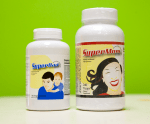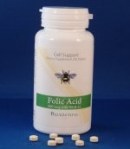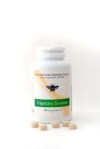This post by Esther Ramsey originally appeared in our Fall 2014 catalog.
Being the oldest of eight children, I expected motherhood to be easy. I naively thought that I could simply fix all the problems I saw other parents facing: obviously, my child would never be allowed to throw a tantrum in a store, or throw his food all over a restaurant.
And if at just sixteen I was already able to cook dinner with a baby sibling on one hip while also correcting my math homework, how hard could it be to raise a few of my own?
I remember the leather couches of the perinatologist’s office when he told us it would be a miracle if our unborn child was brought into the world without severe mental handicaps. Part of me died that day, even though the prognosis turned out not to be true, and it started a pattern of me being given grim news and then working to overcome it.
Then my son was born two months prematurely, which started us down a yellow brick road that went something like “failure to thrive”… ”developmentally delayed”… ”speech delayed”… and ”borderline autistic”. As he got older, the diagnosis morphed into things like “sensory processing disorder” and ”ADHD” (which was an improvement, but still discouraging).
If you asked any medical professional along our journey, she would have said there was no cure for the diagnoses my son has. Oh sure, there’s therapy and early intervention, and psychiatric drugs to help mitigate the more obnoxious symptoms, but nothing you can do to actually fix it.
However, I’ve learned a lot in the nine years since sitting on those leather couches, and contrary to how I felt that day, there is a great amount of hope. Science and research have come a long way, and whether you’re dealing with a dyslexic kid who is having trouble reading and writing, or a kid with Asperger Syndrome who can recite all the ingredients from every can of soup in your pantry, don’t give up.
There is a lot you as a parent can do to help, if not entirely reverse, neurological disorders.
Food, Probiotics, and Digestive Enzymes
The biggest factor has always been diet. For years, research has increasingly indicated that children with any sort of neurological impairment also have compromised digestive systems.
The gut is often referred to as the second brain because it controls so much of how healthily the brain functions. For a struggling child, the brain is like a war-torn ship trying to pump water out and patch up holes in whatever way it can, and the gut is like a 20-ton octopus attached at the bottom either helping or dragging the boat down further.
Whether the culprit originally was vaccine injury, birth trauma, heavy metal poisoning, or genetics, it all tends to swirl together like a perfect storm bent on sinking the ship.
Some kids are seemingly impervious to things like vaccines, and other kids sink like a torpedoed battleship after a simple flu shot. But diet can help to repair those holes. Both GAPS (Gut And Psychology Syndrome) and SCD (Simple Carbohydrate Diet) are the big guns of the gut healing world, with more moderate diets like Gluten free/Casein free also helping.
You can’t simply patch up the ship, though. While you’re using bone broths and gelatin to repair the holes, you also need to hire sailors, and stock the ship with supplies. This is where probiotics (beneficial bacteria) and digestive enzymes (to make the most of food) come in.
Ideally, you should use a wide spectrum of probiotics and switch them up from time to time, like starting with Tummy Tuneup Jr and Toothie Tuneup, then switching out Toothie Tuneup for the stronger Gut Guardian. Add a digestive enzyme like chewable GoGoZymes and you’re well on your way to better gut health.
Cod Liver Oil
High-quality cod liver oil is the great-granddaddy-heavy-hitter of the brain world. Fish oil’s effectiveness (and CLO in particular) is so well documented that you can now buy the candy flavored gummy versions in just about any store from Costco to Wal-Mart.
Unfortunately, those probably won’t do much good, as they are more “candy” than health supplement. The amount of oil is low and the nutritional quality of the oil poor due to high temperature extraction techniques that damage the vitamins. The bio-available Vitamin A in a good fish oil stimulates the brain’s pathways to connect properly, and the EPA/DHA combo of fatty acids work like building blocks in the brain.
I noticed eye contact and verbal skills increased dramatically in my son after starting fish oil. (Pro tip: If you can’t get your kids to take it, try giving it to them via oral syringe after they’re asleep, or letting them chase it with whatever juice is their rarely-allowed awesome treat.)
Giving the Brain A Chill Pill
If you’ve ever thought your child was acting like a jet engine attached to a row boat, get yourself two things: Magnesium and Vitamin B-12. In the case of my son, it wasn’t just his body that was bouncing all over the place (although some kids are like that); rather, it was his brain, and we all had to hang on for dear life as he tore through a million thought processes nobody could keep up with.
Apparently it’s impossible to sleep at night if you’re worried the door might be opened one tenth of a millimeter more than it was the night before, which may or may not allow for a new species of dragons to be let in, because we all know mythological creatures carry around tape measures to catch ignorant parents who don’t listen when their child tells them the door needs to be exactly three inches cracked open.
The imagination? Awesome. The million-miles-a-minute anxiety? That needs to go bye-bye. Magnesium and B-12 worked wonders for this. My kids like the blueberry-flavored Bone Ami, which has the perfect amount of magnesium for a child.
Secondary benefit of Bone Ami? It also has calcium, and I’m convinced it’s the reason my sons have crashed off a hundred playground slides and swings without breaking anything yet. Tertiary benefit? The magnesium helps with constipation, which can be another big digestive problem for kids with neurological disorders.
The B vitamins in general are important for brain support and health, with B-12 being especially crucial for children with learning disorders. Simply put, it acts as a freeway for all cell growth and regeneration in the brain. If those freeways are broken down, or filled with bumper to bumper traffic every day, then the brain ceases to function optimally.
You know you’ve got Los Angeles-level traffic problems in your child’s brain when he has high anxiety, is neurotically freaking out about the littlest things, and overall is just unhappy. It’s time to bring in the B-12 vitamins. Thankfully these also come in a dropper or chewables and are easy to get into even the pickiest child.
Essential Oils
This is a new area of research for me. (And there’s so much to learn!) Until recently, I only thought of Frankincense as one of the three gifts brought to baby Jesus, and then I found out firsthand that the essential oil is quite the superhero when it comes to saving the brain. It’s the heavy hitting oil for mental clarity, dispelling brain fog and clearing up pathways for optimal thinking. I line up all of my children and apply a dilution to their big toes and the base of their skulls.
Lavender and Chamomile are the other two essential oils in my tool box for kids. I keep the lavender oil bottle right on the kitchen counter while we do schoolwork, where I can easily rub it on frustrated temples when multiplication and division concepts just don’t make sense to little minds. I’ve also been known to liberally apply Lavender on myself because no one wants a teacher yelling about how obvious it is that two baskets with three apples in each equal six apples!
Lavender oil and chamomile oil also work great for those middle of the night woes where you can’t figure out what your child is crying about. For nightmares and unidentified ailments, I mix lavender and chamomile with coconut oil and massage their little backs and foreheads. My husband says the boys room sometimes smells like an apothecary shop when he gets up in the morning. I tell him it’s merely a warning sign that I’ll need lots of coffee that day!
I’ve since discovered even more powerful benefits of essential oil blends, and wrote about how they impacted my family here.
The Special Agents With Controversial Agendas
One of the biggest factors in autism and developmental delays is heavy metal toxicity and its evil twin, unhealthy yeast overgrowth. Usually one doesn’t happen without the other, although it’s anyone’s guess as to which comes first. Did the heavy metal cause the body to lose its ability to fight the yeast, or did the yeast compromise the body’s ability to chelate the unwanted metals? Either way, both yeast and metals need to be evicted.
This is the reason diet and probiotics were the first tools I mentioned. When you starve the bad yeast from their beloved sugar-fuel (or anything that turns into sugar), and you start feeding your child nutrient-dense food, those bad bugs freak out and die by the thousands.
As the body heals, it starts naturally flushing the mercury, lead, and aluminum that acted like a ball and chain in the brain. As the evil stuff is tossed overboard (sometimes literally, I’m afraid to say… so be ready with activated charcoal!), you have to repopulate the gut with good bacteria. Use kombucha, sauerkraut, kefir, and any other living, fermented foods that you can get your hands on, and supplement with even more strains of probiotics.
But sometimes those metals are stubborn and that yeast refuses to budge. The gentlest way to escalate your war against yeast and metal is to start out with diet, and then slowly add other forms of detoxification. Yeast Assassin is a veritable ninja on yeast, but it’s powerful stuff so start with a half capsule after a week of the GAPS protocol and work up from there. (Consider the Lite version, if your kids can swallow large pills.)
Chlorella binds and flushes heavy metals, but if your child’s body isn’t working properly it ends up being like a busy airport with no traffic controller: planes going everywhere with the luggage and flight paths all mixed up. Ideally, add Chlorella after your child is well past the initial detox stage and has been doing some sort of gut healing protocol for at least a month.
Even then, chlorella is somewhat controversial as it hasn’t been studied well enough to know the time frame of its chelating properties, making it a bit like trying to schedule those airplanes without a super accurate clock. A lot of people report great success with it, so I’m putting it in the toolbox even though I haven’t personally used it yet.
Last But Not Least
There’s good ol’ fashioned sunlight, or rather, one of its gifts, Vitamin D3. Recent studies show that a lot of children are deficient in Vitamin D thanks to shifting cultural paradigms and the widespread use of sun block. Kids with neuro disorders also have a harder time absorbing Vitamin D3, and research suggests they need a much higher dose than most other people.
Vitamin D3 works to moderate brain development and is responsible for the growth of neurons. Ideally I like my kids to get Vitamin D3 from playing outside, but I also give them Vitamin D3 drops not only to supplement what they’re getting naturally, but also to ensure their body has it available to use from several different resources. If I had to pick only one thing to give my children, it would be Vitamin D3. The drops are flavorless and potent, making it an easy supplement to give even babies.
Don’t Give Up
My son was re-evaluated recently for special ed, and shockingly, he’s almost all caught up to his peers. The language and social skills that were so absent when he was five are now neurotypical and age appropriate. The math and reading he once struggled to understand are now whipped through with speed (he’s still a jet engine attached to a row boat).
 It isn’t always easy. We have regressions, and we have breakthroughs. My other sons have their own set of health challenges that keep me researching, and I’m sure my toolbox of remedies will have to grow and expand. Every child is different, and no two neuro disorders are exactly alike, but hopefully with the right tools, you can find the healing and support their little bodies and minds crave.
It isn’t always easy. We have regressions, and we have breakthroughs. My other sons have their own set of health challenges that keep me researching, and I’m sure my toolbox of remedies will have to grow and expand. Every child is different, and no two neuro disorders are exactly alike, but hopefully with the right tools, you can find the healing and support their little bodies and minds crave.
Esther is the mom of four rambunctious boys who keep her in a semi-constant state of insanity. When she is not coming up with creative ways to get bone broth and other nutrients down her kids, she’s a book addict who is convinced there is nothing that cannot be learned with enough research. She lives in Southern California where she thinks the ocean is nature’s ultimate spa, the sun is an antidepressant, and gardens are pharmacies.
Are there children you love who struggle with neurological issues? Share this post with a friend who might need it!


 1. Eat liver-happy foods. These include garlic, leafy greens, grapefruit, green tea, and grains, along with apples and avocados. These foods are known to help support and nourish the liver, while not overburdening it.
1. Eat liver-happy foods. These include garlic, leafy greens, grapefruit, green tea, and grains, along with apples and avocados. These foods are known to help support and nourish the liver, while not overburdening it.



 Christy Stouffer moved from the “big city” to rural middle Tennessee where she enjoys gardening, living in a small community among friends, learning about the natural things God has given us for nutrition, and homeschooling her four children with her husband. She is a pianist in her church fellowship and a valued resource of encouragement and wisdom for younger women in her life. Christy’s enthusiasm and research about nutrition and wholesome living is appreciated by all who know her.
Christy Stouffer moved from the “big city” to rural middle Tennessee where she enjoys gardening, living in a small community among friends, learning about the natural things God has given us for nutrition, and homeschooling her four children with her husband. She is a pianist in her church fellowship and a valued resource of encouragement and wisdom for younger women in her life. Christy’s enthusiasm and research about nutrition and wholesome living is appreciated by all who know her.





 Why You (Yes, YOU) Need Probiotics
Why You (Yes, YOU) Need Probiotics




 It isn’t always easy. We have regressions, and we have breakthroughs. My other sons have their own set of health challenges that keep me researching, and I’m sure my toolbox of remedies will have to grow and expand. Every child is different, and no two neuro disorders are exactly alike, but hopefully with the right tools, you can find the healing and support their little bodies and minds crave.
It isn’t always easy. We have regressions, and we have breakthroughs. My other sons have their own set of health challenges that keep me researching, and I’m sure my toolbox of remedies will have to grow and expand. Every child is different, and no two neuro disorders are exactly alike, but hopefully with the right tools, you can find the healing and support their little bodies and minds crave.










